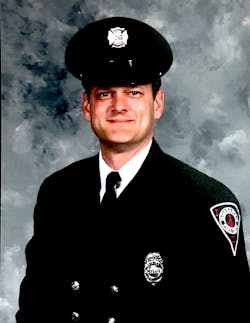Health & Wellness: Insomnia Relief for Firefighters: The Role of CBT-I
Firefighters overwhelmingly report issues with sleep quality and quantity. Although there are multiple factors and diagnoses that relate to sleep problems, one of the more pervasive difficulties is chronic insomnia. For firefighters who suffer from insomnia, cognitive behavioral therapy for insomnia (CBT-I) has emerged as a highly effective treatment.
CBT-I is a standardized, evidence-proven, six-week treatment. It’s grounded in the idea that by changing maladaptive thought patterns and behaviors, individuals can learn to improve their sleep patterns and overcome insomnia. Seventy-five percent of people who undergo CBT-I report clinical improvement. That said, CBT-I comes with challenges for firefighters.
Benefits
Better cognitive function. The ability to make rapid decisions in high-pressure situations is part and parcel of the fire service at all levels. If a firefighter is mentally compromised because of insomnia, the effects can manifest through poor decision-making. Because CBT-I treats the causes of insomnia and improves sleep, it also enhances cognitive function and leads to better decisions.
Enhanced mental health. Although CBT-I is designed particularly to treat insomnia, it also is an adjunct treatment for anxiety, depression and post-traumatic stress disorder (PTSD). For firefighters, improved mental health can lead to better coping mechanisms for stress and traumatic experiences.
Increased resilience. CBT-I teaches relaxation techniques that are useful beyond the realm of sleep. These techniques, particularly when practiced proactively, help firefighters to bend but not break when they face the inevitable mental challenges of their work. Also, being better rested provides the basis for a more positive outlook and even better connection with others, both of which assist with resilience.
Potentially lower cancer rates. The immune system becomes heavily compromised with a lack of sleep.
By providing better, more routine sleep, CBT-I allows the immune system to function better. As a result, cells that have damaged DNA are more likely to be repaired or destroyed if repair isn’t possible, which thereby lowers the risk of cancer.
Reduced risk of accidents. Fatigue because of insomnia can impair reaction time and decision-making, which increases the risk of accidents on duty. These risks also can extend off duty. For example, the National Highway Traffic Safety Administration estimates that 100,000 vehicle accidents can be attributed to drowsy driving annually. CBT-I helps to reduce this risk by promoting healthier sleep patterns, which ensures that firefighters are more alert both on and off shift.
Lower reliance on medications. It’s common for firefighters who suffer from insomnia to take over-the-counter or prescription medications to aid sleep. However, none of these medications treats the causes of insomnia. Therefore, these medications don’t cure the condition. By directly treating the causes of insomnia, CBT-I provides a pathway to reduce or eliminate those medications, which 90 percent of CBT-I patients take.
Challenges
CBT-I requires a high level of commitment and consistency. For example, a daily sleep diary is required, adherence to a sleep schedule is necessary and, after a certain point, daily relaxation techniques must be done. These things can be difficult during a busy shift and particularly after a long shift.
Sometimes, what firefighters believe is insomnia is something else, such as anxiety or PTSD. CBT-I, although a useful adjunct treatment, isn’t designed to treat sleep symptoms that are associated with conditions other than insomnia. Treating these other conditions with CBT-I as an adjunct treatment for accompanying insomnia is possible but requires a coordinated approach with additional clinical professionals.
Once firefighters complete a course of CBT-I and experience improved sleep, maintaining progress can be difficult. It’s easy to forget the lessons learned from the sleep hygiene and relaxation technique portions of CBT-I and to fall back into old habits. Furthermore, shift work and continuous exposure to traumatic events can trigger a recurrence of insomnia symptoms. Vigilance and a willingness to reincorporate the strategies that are used during the CBT-I program might be necessary for continued success.
Although CBT-I proved effective in the general population, there isn’t much research that shows whether firefighters’ unique needs benefit from some form of specialized CBT-I. Developing CBT-I programs that address the stressors and challenges that are particular to firefighting might be useful. Still, plenty of other careers involve high stress and sleep disruptions. In that regard, firefighting isn’t unique, and CBT-I as it currently is configured is the best first-line treatment for firefighter insomnia.
Where to turn
By addressing the causes of insomnia, CBT-I helps firefighters become safer, better thinkers who have increased resilience and, potentially, are more resistant to diseases, such as cancer, that plague this population. What’s more, CBT-I provides a drug-free alternative to other methods that only treat the symptoms of insomnia.
All of this isn’t to say that CBT-I is an easy fix for firefighters who suffer from insomnia. It requires high levels of dedication, consistency, discipline and honesty from firefighters who are willing to take six weeks of CBT-I seriously. However, the benefits of better sleep can’t be overstated.
Finding a CBT-I clinician can be challenging, but there are websites that assist with finding help. One way to locate clinicians is through CBT-I pioneer Dr. Gregg D. Jacobs. The International Directory of CBT-I providers through the University of Pennsylvania Perelman School of Medicine is another source that can provide valuable guidance to firefighters.
About the Author

Brandon Dreiman
Brandon Dreiman is a captain and 22-year veteran of the Indianapolis Fire Department, where he serves as the coordinator of firefighter wellness & support. He also is an International Association of Fire Fighters (IAFF) Peer Support & Resilience Master Instructor and serves on the IAFF’s Crisis Response Team. Dreiman is a cognitive behavioral therapy for insomnia (CBT-I) clinician, a Certified Sleep Science Coach, a Certified Addiction Peer Recovery Coach and a yoga teacher. He is the founder of Naptown Yogawalla.
